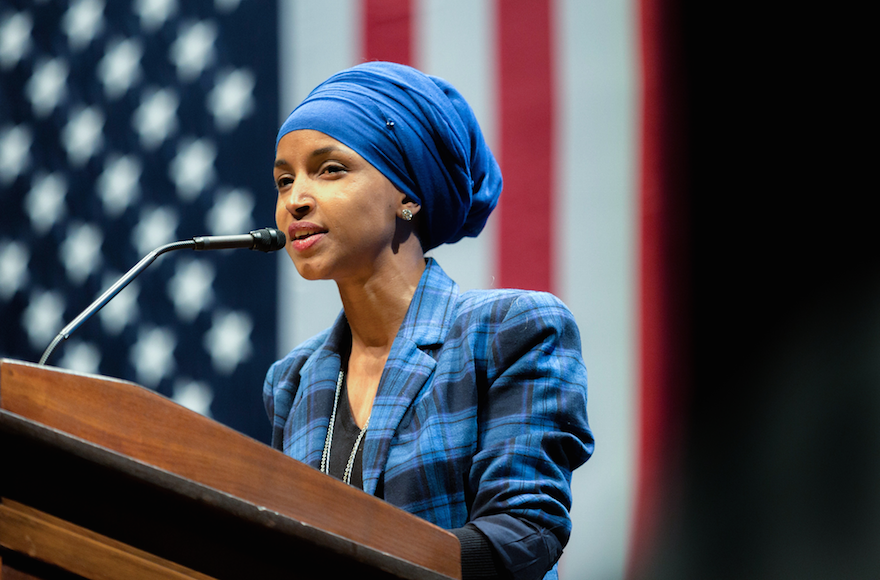WASHINGTON (JTA) — Ilhan Omar, who once called Israel an “apartheid regime,” but who more recently came out against the boycott Israel movement, handily won the Democratic nomination in a Minneapolis-area congressional district.
Omar, a Somalia-born community activist and representative in the State House, is favored to win in November in the 5th District now held by Keith Ellison, who won the DFL primary for state attorney general. DFL is the state’s Democratic Party.
Minnesota was one of four states to hold primaries on Tuesday along with Wisconsin, Connecticut and Vermont.
Omar’s tweets about Israel have earned her notoriety in the pro-Israel community. In 2012, she said that Israel had “hypnotized the world” to ignore its “evil doings.” Defending that tweet earlier this year, she said on the same platform that calling attention to the “Israeli apartheid regime” was not anti-Semitic.
Speaking last week at a candidates’ forum at Beth El Synagogue in Saint Louis Park, she affirmed her belief in Israel’s right to exist and said she opposed the Boycott, Divestment and Sanctions movement targeting Israel.
“It is going to be important for us to recognize Israel’s place in the Middle East and the Jewish people’s rightful place within that region,” she said, according to a report by a local news site, TC Jewfolk.
“I believe right now with the BDS movement, it’s not helpful in getting that two-state solution,” said Omar, who had been endorsed by the DFL. “I think the particular purpose for [BDS] is to make sure that there is pressure, and I think that pressure really is counteractive. Because in order for us to have a process of getting to a two-state solution, people have to be willing to come to the table and have a conversation about how that is going to be possible and I think that stops the dialogue.”
Omar is one of two Muslim women likely to be the first elected to Congress. The other is Rashida Tlaib, who won her primary in a Detroit-area district last week.
Ellison was the first Muslim elected to Congress, in 2006. He goes into the November election dogged by allegations of domestic abuse by a former girlfriend. He denies the allegations.
Dean Phillips, the Jewish heir to a distillery fortune and the founder of a gelato company, handily won the DFL primary in the state’s 3rd District and will face incumbent Republican Erik Paulsen in November. Democrats believe they have a shot at flipping the district, which comprises suburbs of Minneapolis-St. Paul.
Phillips, who rejected money from political action committees, is the grandson of Pauline Friedman Phillips, better known as the advice columnist Dear Abby.
Angie Craig, a former executive who is married to a Jewish woman, was uncontested in the DFL primary in the 2nd District, which comprises the Minneapolis-St. Paul metro area and some suburbs. She faces incumbent Republican Jason Lewis in the fall in another district that Democrats hope to flip.
In neighboring Wisconsin, Paul Nehlen, who is openly anti-Semitic, failed in his bid to win the Republican nod to replace Rep. Paul Ryan, the U.S. House of Representatives speaker. Nehlen finished a distant third in the southeastern 1st District, garnering 6,526 votes, or 11 percent. Bryan Steil, a former aide to Ryan, is the GOP nominee.
In Wisconsin’s 6th District, comprising Milwaukee’s outer suburbs, Dan Kohl, a scion of the state’s department store family and a nephew of former Sen. Herb Kohl, was uncontested in the Democratic primary and will face incumbent Republican Glenn Grothman in November. Kohl is a founder of J Street, the liberal Jewish Middle East policy group, and had its endorsement.
In Vermont, Sen. Bernie Sanders, an Independent, won the Democratic primary but said he would reject it and run as an Independent. Sanders, who mounted an unexpectedly strong challenge in 2016 for the Democratic presidential nomination, has confounded the party’s establishment with his insistence on remaining an independent while caucusing with the party. Sanders was the first Jewish candidate to win major-party nominating contests. He lost to Hillary Clinton.
In Connecticut, David Stemelman, an investment counselor who is active in the Greenwich Jewish community, finished third with 18 percent of the vote in the Republican primary for governor. He lost to Bob Stefanoswki, also an investment counselor, who garnered 30 percent of the vote.
Stefanowski now faces Ned Lamont, a cable executive who won the Democratic nod. Lamont made headlines in 2006 when he defeated then-Sen. Joe Lieberman in the primaries. Lieberman, the first Jewish candidate on a major party ticket as Al Gore’s running mate in 2000, went on to re-election in 2006 as an Independent.
JTA has documented Jewish history in real-time for over a century. Keep our journalism strong by joining us in supporting independent, award-winning reporting.






